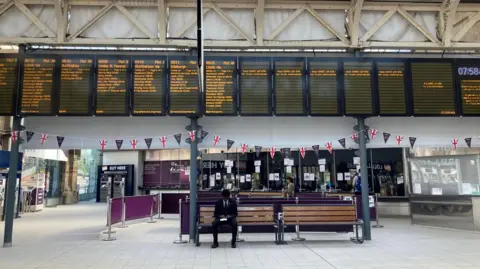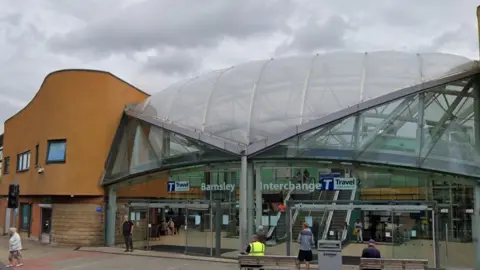Rail strategy to focus on speed and reliability
 BBC
BBCA long-term plan to improve Barnsley's train services has been launched, with the aim of providing "faster and more reliable" rail links.
The new strategy was intended to lead to enhanced rail connectivity, making travel easier and quicker, and boosting economic growth, according to Barnsley Council.
It would focus on local routes as well as rail links to Doncaster, Meadowhall and Leeds and high-speed and intercity links to places like Manchester and London, according to the authority.
James Higginbottom, cabinet spokesperson for environment and transport, said: "The challenges are the lack of investment, passenger experience, trains running on time and going to places people want to go."
 Google
GoogleThere are a total of 10 railway stations within the Barnsley borough, but all its rail lines suffer from low frequency of services, slow journey times and ageing rolling stock.
The Hallam Line provides a stopping service between Leeds and Sheffield and serves Darton, Barnsley Interchange, Wombwell and Elsecar, but journey times are slow.
The Wakefield Line, known locally as the Dearne Valley Line, is the main route between Sheffield and Leeds, with a loop to serve Rotherham Central.
It provides a faster journey than the Hallam Line, but the stopping nature of services again means journey times on the route remain slow.
Meanwhile, the Penistone Line provides a stopping service between Sheffield and Huddersfield.
In the late 1980s, the entire route was threatened with closure due to declining passenger numbers, and a single track means only one train an hour can operate.
'Sustainable growth'
According to the new strategy, which is expected to be discussed by Barnsley Council's cabinet on Wednesday 25 June, a major focus would be on boosting the number of trains per hour and improving the overall reliability of services, addressing issues like single-track sections and capacity constraints.
As part of the strategy, existing stations could be upgraded, new stations could be added and the potential for using freight-only lines for passenger services would be explored, the council said.
Plans to integrate railway stations in the borough of Barnsley with walking and cycling routes would also be examined.
However, councillors were expected to be told that the authority could not work alone and would use the strategy to help lobby the government, rail industry and South Yorkshire Mayoral Combined Authority for funding.
Higginbottom said: "This strategy is to give us the blueprint of how we want our railways to improve.
"This document is not going to immediately transform the railways. We know it's a long process and it takes investment, but you have to start somewhere.
"This will enable us to look at funding in the longer term to make the changes rail passengers need and deserve.
"The issues are the same up and down the country and if we want people to have a first class railway to use, we've got to invest."
Listen to highlights from South Yorkshire on BBC Sounds, catch up with the latest episode of Look North
